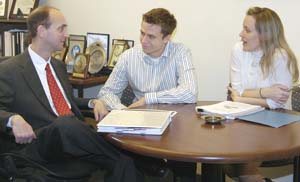Third-year law students Laura Crane and Dan Tierney will begin their legal careers with a unique foreign policy perspective, thanks to an internship with the law school’s 2008-10 ambassador in residence, Thomas Schweich, J.D.
Schweich, in addition to serving as a visiting professor of law, is working as special representative for Central America, Mexico and the Caribbean for the United Nations Office on Drugs and Crime (UNODC). Crane and Tierney were selected to aid Schweich in preparing for meetings with senior diplomats, politicians and law enforcement officers in the region.

The students conducted research on opportunities for possible UNODC programs in Central America, Mexico and the Caribbean involving international policy and justice issues as well as working to develop potential areas for UNODC involvement with the Merida Initiative.
The Merida Initiative is a partnership between the United States, Mexico and Central American nations to help stop illegal drug trafficking.
“Laura and Dan are very bright, capable people,” Schweich said. “They are true triple threats. Both are excellent oral presenters, skilled writers and show real potential as diplomats as well. They produced high-quality papers that were extremely well-received.”
In the summer of 2008, Crane accompanied Schweich on a trip to the UNODC headquarters in Vienna to discuss concerns facing Mexico and opportunities for the UNODC to build its presence in Central America and the Caribbean.
“I worked closely with Ambassador Schweich in advance of our trip to Vienna to become versed in the challenges that the region faces,” Crane said. “This knowledge was quickly put to use in our visit to Vienna, where I was able to see firsthand the way in which high-level diplomatic meetings are conducted.”
Crane will accompany Schweich for a ministerial meeting on Central American security in Costa Rica later this month.
Tierney went with Schweich to the “First Inter-American Meeting of Ministers Responsible for Public Security,” hosted by the Organization of American States (OAS) and held in Mexico City in October.
“During the OAS conference, I sat in on very high-level meetings with foreign officials and worked actively with the UNODC,” Tierney said.
“I witnessed domestic, regional and international policy being created; it was incredibly exciting,” he said.
Other highlights of Tierney’s trip included meeting President Felipe Calderon of Mexico and then-U.S. attorney general Michael Mukasey.
Last month, Tierney attended meetings with Schweich at the State Department, the Justice Department and the Department of Homeland Security in Washington, D.C.
Crane and Tierney are preparing for careers in corporate law after graduation. Both find that the internship experience has impacted how they will practice law.
“There is no question that we are all members of global community, and that our actions affect one another,” Tierney said. “This position has heightened my international awareness and given me skills that I will employ throughout my career.”
Crane agreed.
“Having the chance to experience the ‘policy’ side of international diplomatic work has opened my eyes to career possibilities that I would never have been exposed to outside of this internship,” she said.
The Ambassadors Program, administered by the Whitney R. Harris World Law Institute, brings foreign-service professionals to the law school to share their experiences and knowledge with the law school and WUSTL community.
Schweich served the administration of George W. Bush as the ambassador for counternarcotics and justice reform in Afghanistan, as the government’s deputy assistant secretary of state and acting assistant secretary of state for the Bureau of International Narcotics and Law Enforcement Affairs and chief of staff to the U.S. Mission to the United Nations.